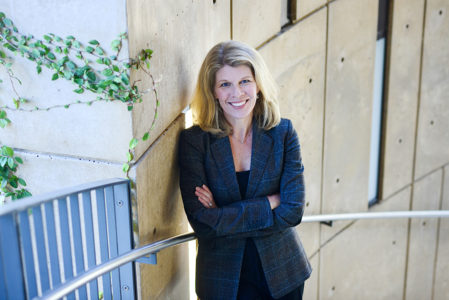Stanford Law School’s Nora Freeman Engstrom Designated Chair for American Law Institute’s Restatement of Torts
The American Law Institute (ALI) has designated Nora Freeman Engstrom, Stanford’s Ernest W. McFarland Professor of Law, as the R. Ammi Cutter Reporter’s Chair. She received this honor for her work as a Reporter on the Third Restatement of Torts: Concluding Provisions, one of three projects that will complete ALI’s Third Restatement of Torts. The R. Ammi Cutter Chair is designated upon recommendation of the Director to the President of ALI. In announcing Professor Engstrom’s designation, ALI President David F. Levi explained that the honor reflects the ALI’s appreciation for her “outstanding service.”

“Nora’s creative and incisive thinking, prolific and influential scholarship, and passion for law and ethics are an enormous asset to the legal profession and the world. I can think of no one more deserving of this important distinction,” said Mariano-Florentino Cuéllar, member of the Council of the ALI, president of the Carnegie Endowment for International Peace, former justice of the Supreme Court of California, and previously the Stanley Morrison Professor of Law at Stanford Law School (SLS).
Established in 1991 in honor of R. Ammi Cutter, Associate Justice of the Supreme Judicial Court of Massachusetts from 1956 to 1972 and President of the ALI from 1976 to 1980, the Cutter Chair is occupied by an active Reporter of proven effectiveness for the remaining duration of the project on which the Reporter is engaged.
“Nora is the complete package as an ALI Reporter. She is a deft writer and superb editor, generously supports her co-Reporters with her time and advice, gracefully and diplomatically handles the criticism that is endemic to ALI reporting, is a whip-smart legal analyst, and is obsessively committed to getting the details right. In short, she is as good as it gets in ALI reporting,” said Michael D. Green, Brown Visiting Professor at the Washington University School of Law and Engstrom’s Co-Reporter on the Concluding Provisions project.
Beyond her work for the ALI, Engstrom co-directs the Stanford Center on the Legal Profession and studies and teaches both tort law and legal ethics. Much of her work explores the day-to-day operation of the tort system and particularly the tort system’s interaction with alternative compensation mechanisms. Engstrom has also written extensively on trial practice, complex litigation (including MDLs), attorney advertising, alternative litigation finance, contingency fees, tort reform, and law firms she calls “settlement mills”—high-volume personal injury law practices that heavily advertise and mass-produce the resolution of claims. Before joining Stanford’s faculty in 2009, she was a Research Dean’s Scholar at Georgetown University Law Center and an associate at Wilmer Cutler Pickering Hale and Dorr LLP. Engstrom was a law clerk to Merrick B. Garland of the U.S. Court of Appeals for the District of Columbia Circuit and Henry H. Kennedy Jr. of the U.S. District Court for the District of Columbia. Before that, she worked at the U.S. Department of Justice, focusing on terrorism and national security issues. Engstrom graduated from Dartmouth College in 1997, summa cum laude, and from Stanford Law School in 2002, with Distinction and as a member of Order of the Coif.
The American Law Institute is the leading independent organization in the United States producing scholarly work to clarify, modernize, and improve the law. Comprised of approximately 3,000 lawyers, judges, and law professors, the ALI drafts, discusses, revises, and publishes Restatements of the Law, Model Codes, and Principles of Law that are enormously influential in the courts and legislatures, as well as in legal scholarship and education.
About Stanford Law School
Stanford Law School is one of the nation’s leading institutions for legal scholarship and education. Its alumni are among the most influential decision makers in law, politics, business and high technology. Faculty members argue before the Supreme Court, testify before Congress, produce outstanding legal scholarship and empirical analysis, and contribute regularly to the nation’s press as legal and policy experts. Stanford Law School has established a new model for legal education that provides rigorous interdisciplinary training, hands-on experience, global perspective and focus on public service, spearheading a movement for change.
